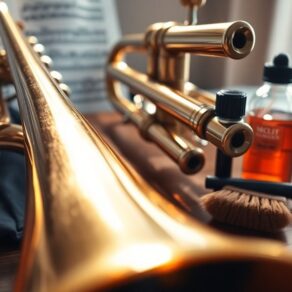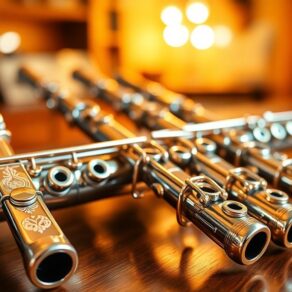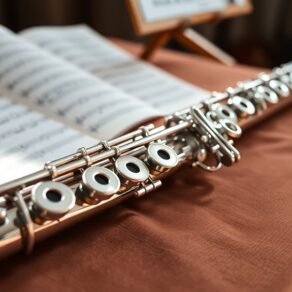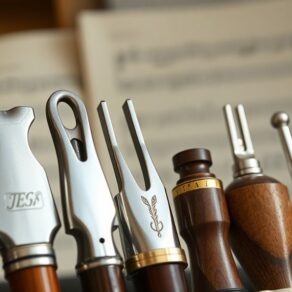If you're looking to explore classical music performance, the violin, cello, piano, clarinet, and flute are your top five instruments. The violin is central to ensembles, offering dynamic techniques. The cello's rich tones evoke profound emotions. On the other hand, the piano's versatility allows for expansive expression in both solo and ensemble settings. The clarinet delivers a unique timbre, while the flute's agility and bright sound add vibrant textures. Each instrument requires dedicated practice and a diverse repertoire to fully realize its potential. As you consider these options, you'll uncover the nuances that define your musical journey.
Key Takeaways
- Violin: Central to classical ensembles, offering a wide range of techniques and repertoire that enhance expressiveness and performance quality.
- Cello: Known for its rich tones and emotional depth, it boasts a vast repertoire from Baroque to contemporary, fostering community connections.
- Piano: Versatile and foundational in classical music, it enables dynamic control and diverse repertoire, making it essential for solo and ensemble performances.
- Clarinet: With a unique timbre and emotional range, the clarinet's essential techniques and varied repertoire enrich classical music performance.
- Flute: Its bright tone and agility, alongside a rich history, allow seamless integration into ensembles and a diverse repertoire that enhances versatility.
Violin
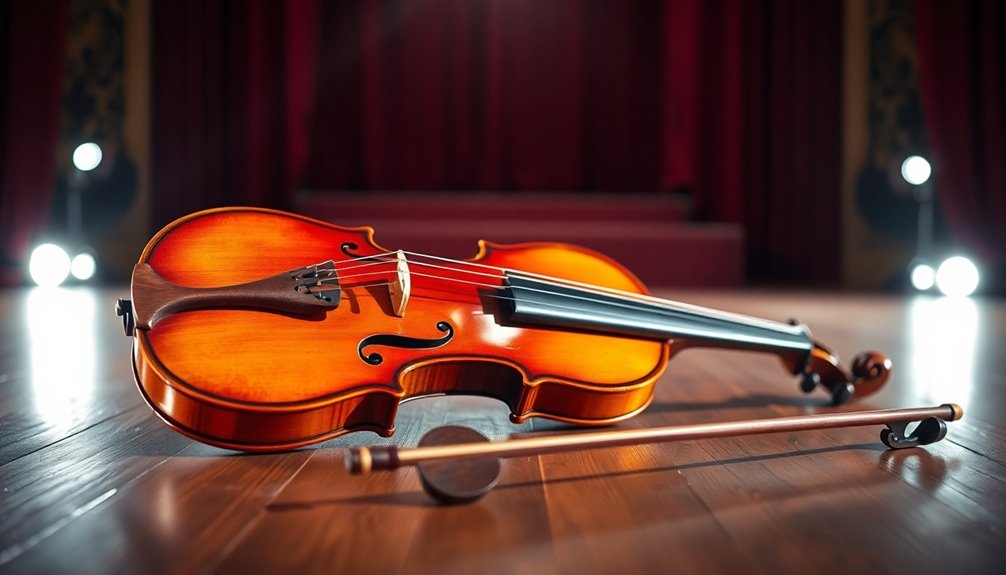
The violin, often regarded as the cornerstone of classical music ensembles, offers a unique blend of expressiveness and technical challenge that captivates both performers and audiences alike. As you explore the world of violin playing, you'll discover a rich tapestry of violin techniques that can enhance your skill set. Mastering bowing styles, vibrato, and shifting positions not only elevates your performance but also deepens your emotional connection to the music.
However, achieving proficiency requires more than just practice; it demands diligent violin maintenance. Keeping your instrument in prime condition is essential for both sound quality and longevity. Regularly checking the strings, bridge, and chin rest guarantees that your violin remains responsive to your playing.
Don't underestimate the importance of cleaning your violin after each session; this simple act can prevent rosin buildup and maintain its aesthetic appeal.
Moreover, understanding how temperature and humidity affect your instrument can help you avoid potential damage. For instance, extreme conditions can warp the wood, compromising its sound. By adopting a routine that incorporates proper care, you're not just preserving an instrument; you're nurturing a partnership that allows you to express your artistry. Additionally, exploring the emotional depth of flute music can provide valuable insights into enhancing your overall musicality and performance.
In the community of classical musicians, sharing your experiences and challenges with violin techniques and maintenance can foster a sense of belonging. Embracing this journey together enriches not just your own practice but also the collective spirit of the ensemble you're part of.
Cello
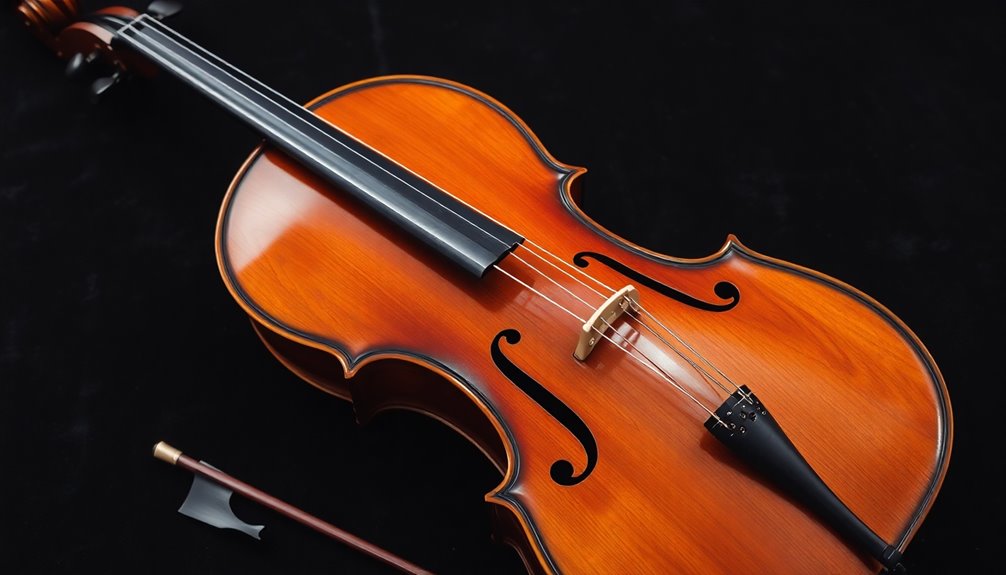
While the violin lays a strong foundation in classical music, the cello commands attention with its rich, resonant tones and profound emotional depth. As you explore the world of the cello, you'll discover that it offers a unique blend of power and intimacy, making it an indispensable instrument in ensembles and solo performances alike.
Mastering cello techniques is vital for revealing its full potential. You'll want to focus on bowing styles, finger placement, and vibrato, as these elements greatly affect your sound. Each technique you learn enhances your ability to express a wide array of emotions, from the softest whisper to the most thunderous roar.
The cello repertoire is vast and varied, ranging from Baroque masterpieces to contemporary works. You'll find pieces by composers like J.S. Bach, who crafted the iconic cello suites, and Dvořák, whose cello concerto beautifully showcases the instrument's lyrical capabilities. Engaging with this repertoire not only hones your skills but also connects you with a rich musical tradition that invites you to be part of a larger community.
When you pick up the cello, you're not just playing an instrument; you're joining a lineage of musicians who've conveyed the depths of human experience through their art. Additionally, exploring the flute family can enrich your understanding of diverse musical expressions and ensemble dynamics.
Embrace the journey, explore the technical aspects, and immerse yourself in the soulful melodies that only the cello can deliver. This instrument might just be your gateway to deep musical expression and connection with others.
Piano
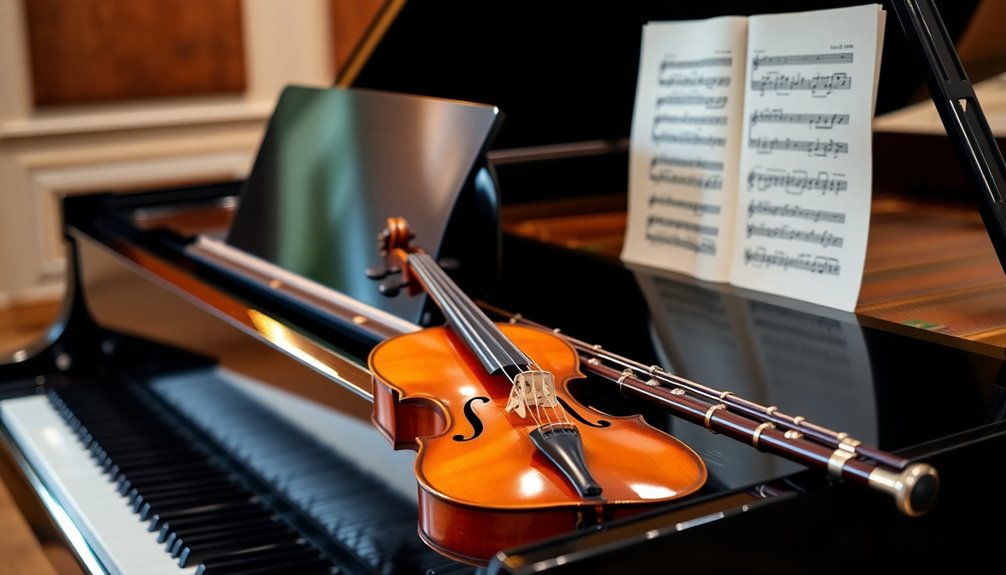
Mastering the piano opens up a world of musical possibilities, making it one of the most versatile instruments in classical music. Its unique ability to convey a wide range of emotions and styles allows you to express yourself fully.
Whether you're performing solo or as part of an ensemble, the piano holds a central role in classical repertoire, securing its place in the hearts of musicians and audiences alike.
To truly excel, you'll need to focus on developing essential piano techniques that enhance your performance:
- Finger Independence: Strengthening each finger's dexterity will allow for smoother shifts and more intricate passages.
- Dynamic Control: Mastering the nuances of volume and expression helps convey the emotional depth of the pieces you play.
- Sight-Reading Skills: Enhancing your ability to read music quickly opens doors to a broader piano repertoire, allowing you to explore diverse works with confidence.
In addition, mastering advanced techniques can significantly enrich your overall musical proficiency as a pianist.
As you explore the rich world of piano music, you'll find that the vast repertoire available spans from Baroque masterpieces to contemporary compositions.
Each piece offers a unique challenge and an opportunity for growth. Engaging with the piano not only hones your technical abilities but also fosters a sense of belonging within the classical music community.
Clarinet
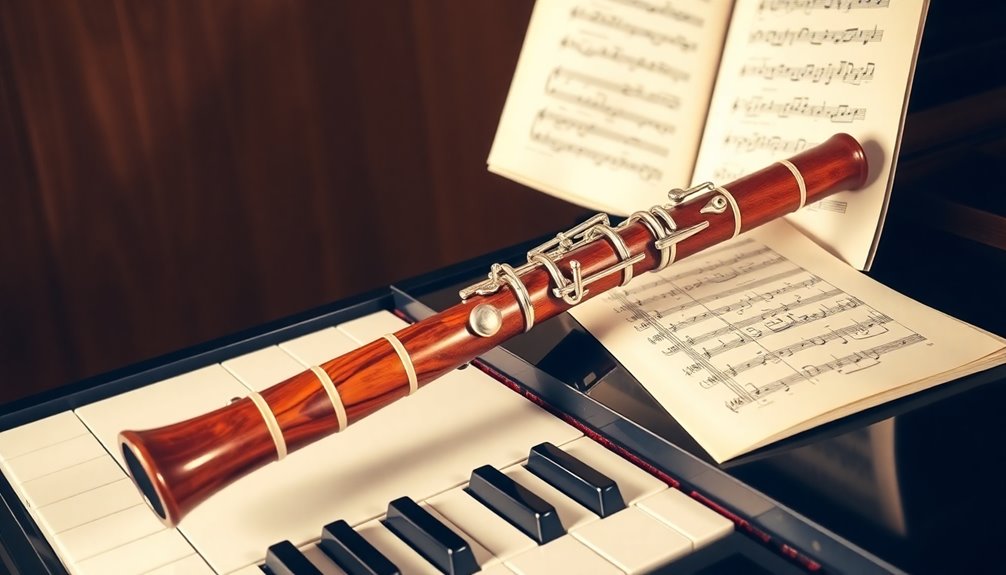
A clarinet offers a unique timbre that can evoke a wide range of emotions, making it a compelling choice for classical music performance. Its versatility shines through in both orchestral settings and solo pieces, allowing you to express deep feelings or create lively atmospheres. Mastering clarinet techniques is essential for revealing the instrument's full potential. This includes breath control, finger agility, and dynamic expression, which all contribute to the clarity and richness of your sound. Consistent articulation is also vital for enhancing the emotional connection with your audience.
When you immerse yourself in the clarinet repertoire, you'll discover a diverse array of compositions that span centuries and styles. From the lyrical melodies of Mozart to contemporary works by living composers, each piece presents a new challenge and opportunity for growth.
Here's a quick overview of key clarinet techniques and repertoire to reflect on:
| Clarinet Techniques | Clarinet Repertoire |
|---|---|
| Breath control | Mozart's Clarinet Concerto |
| Vibrato and articulation | Brahms' Clarinet Sonatas |
| Dynamic range and expression | Copland's Clarinet Concerto |
As you explore these techniques and works, you'll find a rich community of clarinetists who share your passion. Engaging with fellow musicians through masterclasses or ensembles can deepen your understanding and enhance your performance skills. Embrace this journey, and you'll not only grow as a musician but also connect with others who love the clarinet just as much as you do.
Flute
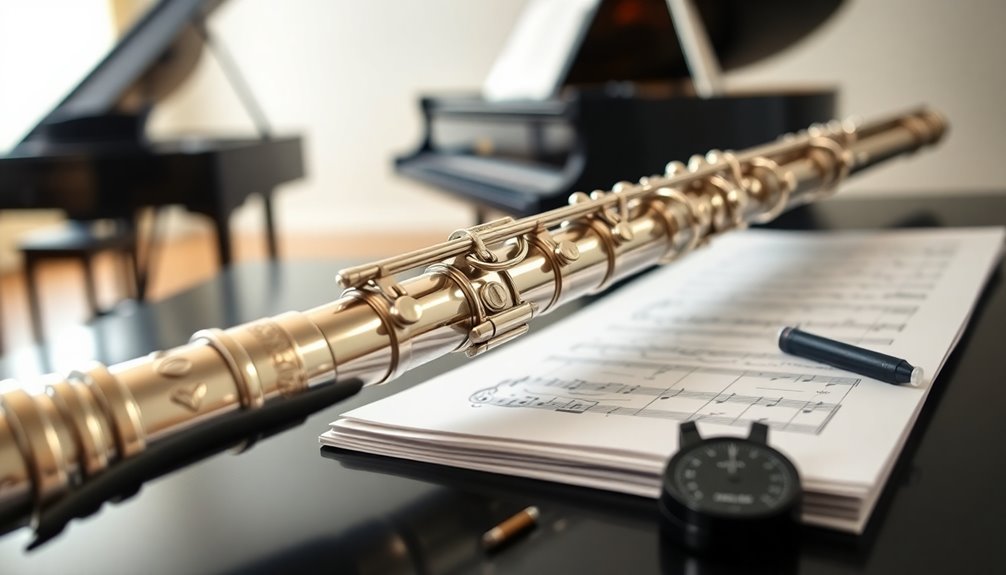
The flute stands out in classical music for its bright, airy tone and remarkable agility. This instrument has a rich history that dates back over 35,000 years, evolving from simple bone flutes to the sophisticated metal versions we see today. Its versatility allows it to fit seamlessly within various musical ensembles, making it a beloved choice for many musicians.
To truly appreciate the flute, you'll want to explore some essential aspects that define its character:
- Flute Techniques: Mastering techniques like vibrato, articulation, and extended techniques can elevate your performance. These skills allow for expressive playing that resonates with the audience, creating an emotional connection.
- Flute Repertoire: The flute boasts a diverse repertoire, ranging from Baroque masterpieces to contemporary compositions. Engaging with this wide array of works not only enhances your skills but also deepens your understanding of the instrument's role in classical music. Many flutists find inspiration in challenging pieces by renowned French composers, which can significantly expand their repertoire and technical skills.
- Flute Community: Joining a community of flute players can provide invaluable support. Whether it's through local groups, online forums, or masterclasses, sharing experiences and tips fosters a sense of belonging that enriches your musical journey.
Frequently Asked Questions
What Are the Benefits of Learning Multiple Classical Instruments?
Learning multiple classical instruments offers significant cross training benefits.
You'll develop a deeper understanding of music theory and improve your overall musicianship.
The versatility advantages are immense; playing various instruments enhances your adaptability, allowing you to tackle diverse musical styles.
It also fosters creativity, as you draw inspiration from each instrument's unique qualities.
Ultimately, embracing multiple instruments connects you with a broader community of musicians, enriching your experience and sense of belonging.
How Do I Choose the Right Instrument for My Age?
Choosing the right instrument for your age can feel like learning to walk a tightrope.
You'll want to reflect on age suitability alongside the different instrument types available. Younger learners often thrive with lighter instruments, like the recorder or violin, while older students might find satisfaction in the piano or cello.
What Are the Best Resources for Classical Music Education?
To enhance your classical music education, online courses are invaluable. They offer structured learning and flexibility, allowing you to study at your own pace.
Immerse yourself in music theory to grasp essential concepts that'll elevate your understanding and performance. Platforms like Coursera and Udemy provide extensive classes, often taught by professionals.
Engaging with fellow learners in forums fosters a sense of community, making your educational journey more enriching and enjoyable.
How Can I Improve My Practice Routine Effectively?
You're not alone in wanting to improve your practice routine; many musicians face the same challenge.
Start by integrating effective practice techniques like focused sessions and varied exercises. Time management is essential—set specific goals for each practice session to stay on track.
You'll find that breaking down your practice into manageable chunks not only enhances your skills but also makes the process feel more rewarding and less overwhelming.
Keep pushing forward!
What Are Common Misconceptions About Classical Music Performance?
You might think classical music performance is all about rigid rules and stiff postures, but that's a common misconception.
Many believe performers must strictly adhere to classical stereotypes, which stifles creativity. Performance myths often suggest that only certain instruments or techniques are valid, but this isn't true.
Embracing a more flexible approach allows for personal expression, making the experience richer and more enjoyable for both you and your audience.
Conclusion
In the world of classical music, each instrument tells a unique story, weaving together emotion and artistry. Whether it's the soaring melodies of the violin or the rich tones of the cello, these instruments breathe life into compositions, enchanting audiences everywhere. Remember, "music is the shorthand of emotion." By exploring these five exceptional instruments, you're not just listening; you're experiencing a profound connection to the heart of classical music. Embrace the journey and let the music speak to you.


